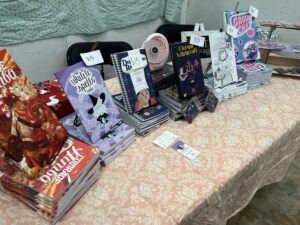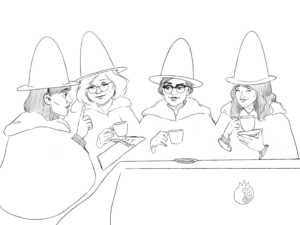I can eat all the bread I want but my girlfriend cannot. She has an autoimmune disorder called celiac disease, so she cannot eat gluten (which comes from wheat). On our second date, I suggested we eat at a Mexican restaurant that was around the corner from my house. She said she would have to check the menu first to see if they had any gluten-free options. What followed was a ritual so familiar I do not even think about it anymore. She took out her phone, googled the place, scrolled through the menu and said she could eat there. This was the first of many lessons I have learned about what living with celiac really means for her.
1) Gluten is in everything, even things you don’t expect.
The only way for a person to treat celiac disease is to stop eating wheat. Sounds easy, right? You might be thinking, “oh, no baked goods,” but gluten is in almost everything. My girlfriend cannot eat any processed foods without checking the ingredients first. I was not surprised that some hot dogs or sausages had wheat mixed in, but I had no idea that several brands of dairy products, such as some ice creams and yogurts, use gluten as a thickener. We have to buy gluten-free soy sauce. My girlfriend can’t even lick envelopes because some use a gluten product to make the glue.
Fortunately, many companies are getting better about labeling products as gluten-free. Not all of them do, though, and my girlfriend ends up spending a lot of time online, checking forums to see if other celiacs have gotten sick from the same brands.
2) Your dining-out options are limited.
I love eating out and trying new restaurants. Since I’ve met my girlfriend, I’ve had to do most of my culinary exploration with friends instead of with her. We tend to stick to a list of about seven places with food she knows she can eat. She likes going out just as much as I do, but it is a risk for her every time. Restaurants try, but kitchens can be busy and careless. She usually goes into restaurants assuming she will probably be sick the next day. That can take a lot of fun out of the dining experience.
To make things worse, even restaurants that have gluten-free options might not have anything that she wants to eat. Unless a restaurant specializes in gluten-free food, they tend to have few gluten-free dishes, and if she does not want one of those few options, she is not going to want to eat there.
3) Gluten substitutes are not health food.
One of the more bizarre things I’ve seen is the way that some people confuse gluten-free products with health food. These people seem to suffer from some bizarre confusion. There is no health benefit to cutting gluten from one’s diet if you can eat it. Gluten is not like salt or fat or sugar. If you want to lose weight, cutting down on bread will help, but that’s because you’ve cut down on calories and carbohydrates. Most gluten-free products, such as gluten-free bread, are predominantly made from nuts and oils and have a higher fat content than normal bread.
4) Gluten free ingredients are not a perfect substitute for flour.
I am a fairly good cook, but learning how to use non-wheat based flours has been a challenge. My first attempt at baking a gluten-free pizza turned into a bizarre mass of thick, crumbly crust covered in melted cheese and roasted peppers. My girlfriend dubbed it “pizza cobbler” and handed me a fork. To her credit, she bravely tries all of my often-questionable attempts to bake things that she can eat. My gluten-free cookies turned into hockey pucks and my fried fish had to be liberated from their burned rice flour breading.
The truth is, most gluten substitutes are also just not as good as the real thing. For example, my girlfriend describes gluten-free pizza crust as having a different consistency. She’ll eat gluten-free alternatives to foods like pasta and hamburger buns, but it is not the same. For this reason, we tend to cook a lot of foods that never had wheat in them in the first place, like cornbread and rice.
5) It is not as big a deal as you think, except it is.
Celiac disease is different from a chronic illness in that it does not worsen or progress, so long as a person successfully stops eating gluten. Celiac is also different from a major food allergy. If my girlfriend eats wheat, she will not go into anaphylactic shock and die. Her body will, however, have an autoimmune response to it and attack itself. All it takes is one crumb. She describes her body’s reaction to gluten as feeling like you have the flu and the migraine at the same time, but worse. It is not immediately life-threatening, but it is miserable. If she kept eating wheat, she would be sick every day and eventually lose the ability to digest food and slowly die from malnutrition.
6) You will feel guilty about eating wheat in front of them at first and then you get over it.
When we first started dating, I would sometimes feel guilty that I could have food my girlfriend couldn’t. I remember ordering a beer and a giant pretzel on a date and then apologizing when it arrived because I thought it would be rude to eat it in front of her. She just shrugged.
“If you can eat it, enjoy it.”
So I eat what I want on dates. On the other hand, when you live together, it just doesn’t make sense to make two meals, so you end up eating a lot of gluten-free meals. I do, however, have a gluten shelf. Most of it is snacks and lunch food, but I also stock up on real pasta and mac and cheese. Living with a celiac does not mean I have to give up gluten. As long as my girlfriend does not eat off my plate, she is fine.
And that is pretty much the heart of dating someone who cannot do something you can. It is their restriction, not yours. If they are not a jerk, they will not guilt-trip you about it.
Food is never just food. It is thousands of years of culture and tradition. Sharing food is one of the most basic acts of friendship and family we have. The meaning behind the food is far greater than the food itself. If the person you love cannot break bread with you, then you bake some cornbread. The restrictions of celiac are annoying and serious, but they are manageable. My girlfriend and I work together to make sure our shared meals are safe for her and then we get on with the business of enjoying our lives.



